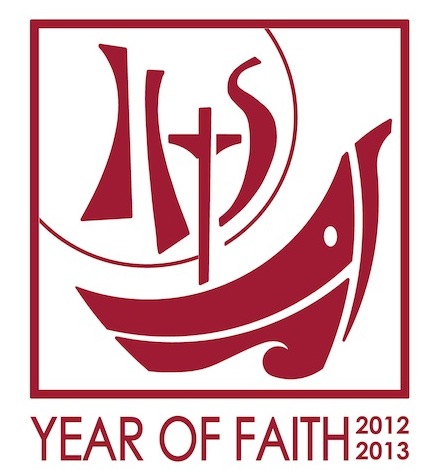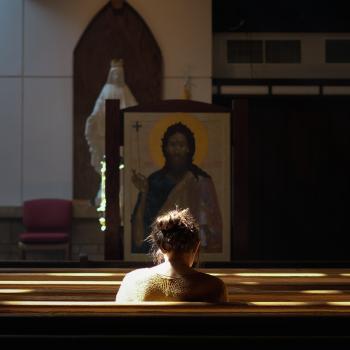That’s the Year of Faith page for Patheos, and it can drive you nuts trying to find it in the dense and challenging mountain of Patheos columns, blogs, resources, videos, essays and ads. But once you have found it, it’s a veritable treasure trove. There’s gold in them thar hills!
Elizabeth Scalia has rounded up a team of All Stars to contribute; aside from the usual Patheos Catholic crew, she’s elicited great contributions from (so far) Bishop Christopher Coyne and Magnificat’s Peter John Cameron, who writes about a subject we don’t hear mentioned much, Divine Providence:
In the opening lines of the Liturgy of the Hours—known as the invitatory psalm—the Church professes of God, “He holds in his hands the depths of the earth.” Which means God holds in his hands the depths of my life: all my worries, my troubles, my nagging concerns big and small, my challenges, my struggles, my phobias. Nothing is beyond the reach of his tender, infallible protectorship. God’s loving providence shepherds the minutest details of our daily life. The high eternal Father says to Saint Catherine of Siena in the Dialogue, “I am constantly providing for what you need at any given time. I am that supreme providence who never betrays my servants’ hope in me in soul or body.”
Divine providence literally “fore-sees” every circumstance and concern of our existence. Saint Claude de la Columbière says that “it is one of the most firmly established and most consoling of the truths that have been revealed to us that (apart from sin) nothing happens to us in life unless God wills it so.” For “whatever happens to us through God’s will,” observes Dominican Father Bede Jarrett, “is always the best possible thing for us. God is not only good, very good, supremely good, but the only good. Therefore his will is and must be always the best for us.” Divine providence is God’s inscrutable strategy to bring about our happiness. As Jesuit Father Jean-Pierre de Caussade writes in one of the greatest spiritual masterpieces of all time, Abandonment to Divine Providence, “Everything has a supernatural quality, something divine about it that can lead us onward to holiness. Everything is part of that completeness which is Jesus Christ.”
Preachers, take note: if you’re looking for good homily material, the Patheos Year of Faith page is a great place to start. Take this nugget, for example, from Elizabeth Duffy:
I think this Year of Faith is designed specifically for the soul who feels dryness at times, who feels depleted, who perhaps knows their faith, and knows it well, but who’s lost the loving feeling. I picture it sort of like mid-life marriage counseling: Of course we’re still in love, but let’s make it better. I don’t want to reinvent myself alone. I want to reinvest in our love.
I am appreciating the simplicity of the Year of Faith, and some of the guidelines our Bishops have provided for living it out.
Go to Mass: have Faith that Christ is present in the Eucharist and that when you receive him he animates you whether you feel anything or not.
Go to Confession: believe that your sins are truly forgiven, even when you don’t leave the confessional in tears.
Read the Bible: even when you feel you’ve read it a thousand times before, it is amazingly, always new, because it speaks to you at the particular state of life in which you read it.
Learn about the lives of the Saints: if you think your life is dull, look to others who’ve gone before you for inspiration.
Read the Catechism and Vatican II: reflect on them, and perhaps spend less time arguing with others about what we think these documents mean.
Help those in need: Nothing takes your mind off yourself like engaging in practical ways in the suffering of others.
We can approach the Year of Faith like a child, like a beggar, like a poor young man rather than a rich one, like someone who believes there is still so much in this 2000-year faith tradition that we can learn. If there’s a particular virtue required for approaching the Year of Faith, it is humility.
Read more from the Year of Faith page. And come back often. It’s worth the trip.












